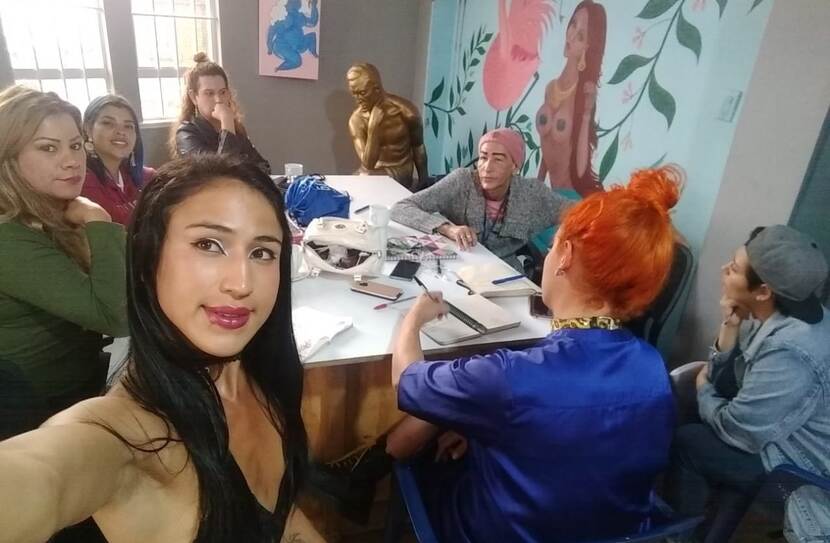Transgender people in Argentina and Colombia fight for equal rights
To mark Transgender Day of Visibility on 31 March, the Dutch embassies in Argentina and Colombia are showing how they and their partner organisations are fighting for equal rights for transgender people. This includes in the job market and in healthcare. 'The programmes supported by the Ministry of Foreign Affairs are building bridges, but they are only a start.'

The human rights situation for transgender people in Argentina and Colombia is dire. A third of trans people in Argentina have HIV, 46% live in poverty and the life expectancy of people in this group is 40 years. In Colombia the murder rate of trans people is high, and they often lack access to healthcare.
The Netherlands is an international advocate for equal rights for lesbian, gay, bisexual, transgender and intersex (LGBTI) people. As such, through the Human Rights Fund the Ministry of Foreign Affairs supports organisations working to ensure equal rights for LGBTI people.
Discrimination
Discrimination against members of the transgender community is rife in Argentina. This puts trans people at a significant disadvantage in the labour market. ‘Six out of ten transgender women in Argentina haven’t finish secondary school because of discrimination,’ says Anne Cremers, who works at the embassy in Buenos Aires. ‘70% have never even had a job interview. And those who are interviewed run up against a wall of ignorance and discrimination if they ever get hired.’
Expanding employment opportunities
The Argentine organisation Impacto Digital is specialised in developing technological solutions for social problems, with a view to defending human rights. To help expand employment opportunities for transgender people, they designed the online platform Contratá Trans. The platform is intended primarily for trans women, who are the most disadvantaged. Through the Contratá Trans platform, trans women can register for courses to help them in interviews and browse the vacancy announcements for job opportunities.
In addition, the platform offers special training for government officials and corporate employees. ‘Contratá Trans educates management teams to better understand the reality of transgender people, and discusses with them various terms related to the concept of gender,’ says Anne. ‘Managers learn how to implement an inclusive communications strategy and a non-discrimination policy.’

Healthcare for transgender people
Transgender people in Colombia also face obstacles. Research from the Colombian Ministry of Foreign Affairs shows that more than 80% of members of the transgender community feel that healthcare providers lack the training to treat them properly. Doctors simply don’t understand their needs. As a result, many trans people in Colombia find their own ways of accessing hormone therapy, without a doctor’s supervision. And transition surgery is often carried out by unqualified individuals, which comes with major health risks.
‘The negative attitude of healthcare providers in Colombia towards transgender people stems mainly from a lack of understanding rather than ill will,’ says Thys Hoeklan, who works at the embassy in Bogota. ‘That’s why we’re working with partner organisations to explore ways of raising awareness and building knowledge.’
Sharing informative videos through WhatsApp

With support from the Ministry of Foreign Affairs, a Colombian partner organisation trained 26 transgender people to help others like them access better healthcare. ‘The network La Liga de la Salud Trans first took stock of the various problems transgender people experience when it comes to healthcare,’ explains Thys. ‘They also worked closely with medical professionals to expand access to healthcare for trans people and to raise awareness among healthcare providers about the care trans people need.’
The organisation used technology to increase their reach. ‘The videos they shared on WhatsApp reached more than 33,000 people in Colombia, including in remote areas across the country,’ says Thys.
Building bridges
In Argentina there are reasons to be hopeful. In 2020 President Alberto Fernández signed a decree, showing he wanted to do more to promote inclusion. Since then, 247 transgender job seekers have registered with Contratá Trans, 104 different businesses, NGOs and public institutions list vacancy announcements on the platform and the initiative has helped 19 transgender people in Argentina find work.
‘Despite all of the challenges brought on by the pandemic, the numbers show that 2020 was a successful year for Contratá Trans,’ says Anne. ‘This type of programme will continue building bridges between disadvantaged groups, employers and society. However, we still have a lot of work ahead of us.’